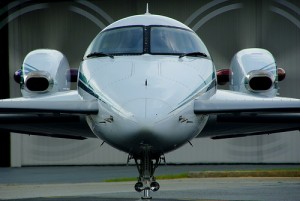
N514RS Starship Beechcraft from the front
About a month ago, I challenged myself to fly on a Beechcraft Starship and I have secured a ride! I get goose bumps just thinking about it.
I have been very surprised how many people have emailed me with suggestions and personal stories of the Beechcraft Starship. There truly is a great following and people love this plane. I thought I might be one of the biggest fans out there, but I might have some competition for that title.
Shortly after my first post I started getting emails suggesting I contact the same person: Robert Scherer. He owns Starship NC-51 (N514RS). He also bought left over Starship parts and runs Starfleet Support (no, not a Star Trek thing), which provides parts to the remaining flyable aircraft. I was also told that Scherer is a pretty cool guy and has a genuine love for the Starship. My readers were right!
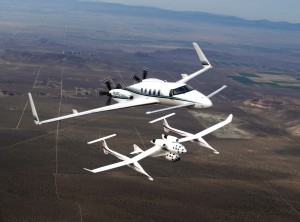
NC-51 - Primary chase for Scaled Composites' Tier One Program. How cool.
I tracked down his contact information and sent over an email. He replied that he would be more than happy to help me out in my quest. AWESOME (I know I use that word a lot, but I REALLY mean it this time)!
NC-51 is one cool Starship. It has been used as the chase plane for Spaceship One, White Knight 2, and is even signed by Burt Rutan (the father of the Starship – click that link, pic of Rutan at the door of NC-51).
Scherer is based out of Aspen, CO (ASE) and routinely flies over to Orange, CA (SNA). I have been invited to go with him on one of his flights in the next few months.
When he flies this route, he leaves ASE and heads to Meeker (EEO) for cheap gas. This is a low level, 15 minute flight over some beautiful terrain. Then he goes around 34,000 feet to fly from EEO-SNA. Want to see what the first leg of the flight looks like? Scherer has a video of one of his flights from ASE to EEO. Um…yes please.
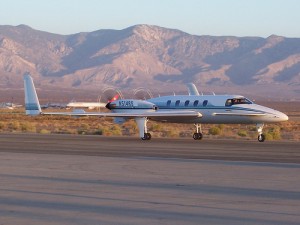
N514RS ready for take off from Mojave, CA
This blog has given me quite a few amazing opportunities since I started it in July 2008, but I have to say this one excites me the most. You can be sure there will be lots of video, photos and Tweets from this wonderful experience.
A HUGE thanks to Robert Scherer for giving me and my readers this great opportunity!
OTHER MEDIA:
* See Scherer talk about the Starship on History Channel’s Boneyard
* Video of NC-51 cockpit
* If this professional video of NC-51 doesn’t gives you goose bumps, you aren’t a true Starship fan
* Cockpit night landing of NC-21 into Austin, TX
* See what happened to every Starship
My Quest to Ride on a Beechcraft Starship:
IDEA | CONNECT | TOUR | FLIGHT-PLAN | FAIL | FLIGHT | PHOTOS | VIDEO
Images: #1 Carlos J Images, #2 Rob Scherer, #3 kittel
Last week I posted photos of the Boeing 787 Dreamliner and Boeing 40C flying in formation. They looked unreal, but were very much real. Many asked “how’d they do that?”
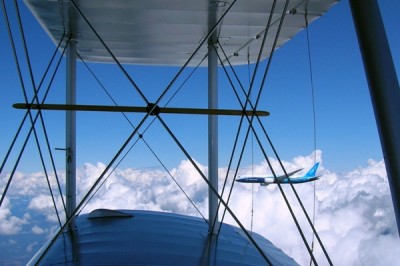
Picture of the Boeing 787 Dreamliner from the Boeing 40C
Well, very carefully. From the AntiqueAirfield website, “The plan was for the Boeing 787 to intercept our flight of three with an overtake on our right side with the Boeing 40 in the foreground and 787 Dreamliner in the background of the photo. The Bonanza was lead for our flight of 3. Two conference calls with Boeing flight test were conducted the morning of the flight to confirm details. The Boeing 787 was light and could overtake us dirty at approximately 150 kts and clean at 190 knots. Our flight of 3 was stabilized at 90 knots. This would provide a 3-7 second photo window during each overtake pass.”
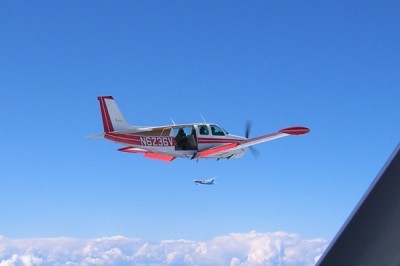
The Bonanza with the Boeing 787 Dreamliner in the background
Learn more about this amazing photo shoot (and see another photo) at AntiqueAirfield.com’s initial blog and newest blog.
Found via IAM751 — Thanks!
connect | web | twitter | facebook |
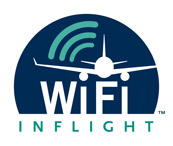
Pretty clever WiFi logo with the dots for the i's being the engines! Logo from Alaska Airlines.
Blogging about airlines adding WiFi to their fleet will never get old for me.
If you remember Alaska caused a bit of a stir after announcing they would be going with Gogo Inglight Internet service instead of Row44, which they were testing. One of the benefits of Gogo is it can be quickly installed onto an aircraft. Alaska already has six planes internet enabled and hopes to have all Boeing 737-800’s and 900’s equipped with WiFi by the end of the Summer. Their entire fleet should be setup by the end of the year. Like other airlines, Alaska will have a WiFi logo by the main cabin door and information in the seat back pocket next to you.
In a partnership with Alaska Airline’s Visa credit card, they are offering the WiFi for free until July 31, 2010. After July 31st northbound flights from Portland and Seattle to Alaska will remain free, until GoGo Inflight is able to improve on cell reception in Alaska. After the free period, prices on other flights will range from $5 to $13 depending on the time and device you want to use.
To find out where WiFi can be accessed, more information and pricing structure, check out Alaska’s Wi-Fi page.
connect | web | twitter | facebook |
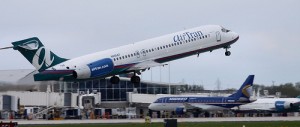
AirTran Boeing 717 taking off while Midwest sits in the background
Dan Webb over at Things in the Sky take a look at AirTran and Frontier deciding to end their mutual relationship. Yesterday Webb looked at AirTran announcing they would give you 32 A+ credits (that will get you two round trip tickets) if you donated 50,000 Midwest miles (also good for two round trip tickets) to charity.
This creates a problem. Last year Republic Airlines bought Midwest and Frontier. Recently they announced they would change the name to “Frontier Airlines.” AirTran and Frontier had an agreement to share customers (not a codeshare however) since 2006. AirTran is playing hardball (I think it is pretty genius) to get Midwest customers, yet were still trying to play nice with Frontier.
Webb guessed this probably couldn’t last for long and he was right. Today he posted that AirTran and Frontier have announced the ending to their partnership. Both airlines are competing in Milwaukee and AirTran is trying to steal customers from Midwest during Frontier’s brand transition just didn’t sit well with Frontier (surprise, surprise right?).
It seems AirTran is making a pretty smart move here. Loyal Midwest customers are now looking where they want to place their loyalties. If you remove your miles from the equation, now you have a new Frontier which will be taking a while to create brand consistency (ie: will your flight have DirecTV? Internet? On an Airbus or Regional Jet?), where AirTran has the consistency of having Wi-Fi and XFM radio on all flights.
Either way, the people of Milwaukee should reap the benefit of two airlines competing for their business. Game on!
Image: md11forver
connect | web | twitter | facebook |
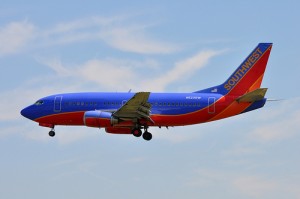
Surprisingly Southwest Airlines made bank off fees in 2009
According to the Bureau of Transportation Statistics (BTS), US airlines made $7.8 billion in fees in 2009. This is a 42% increase over 2008. BTS says in a release “the airlines collected $2.7 billion in baggage fees, $2.4 billion from reservation change fees, and $2.7 billion from other ancillary fees, such as pet transportation fees and frequent flyer award program mileage sales.”
Delta brought in the most money with $1.65 billion in fees and surprisingly Southwest was fourth. Southwest might not charge for bags, but they do charge for other services like pets, unaccompanied minors and an early check-in option. Even before Spirit Airlines started charging for carry-ons, 21% of their total operating revenue came from fees — the highest of any other airline.
$7.8 billion is a lot of money. Passengers keep complaining about fees, but it is obvious that they keep paying them. I am not going to be surprised if more creative fees start showing up in the next few years.
Source: USA Today Image: TVL1970
connect | web | twitter | facebook |







